

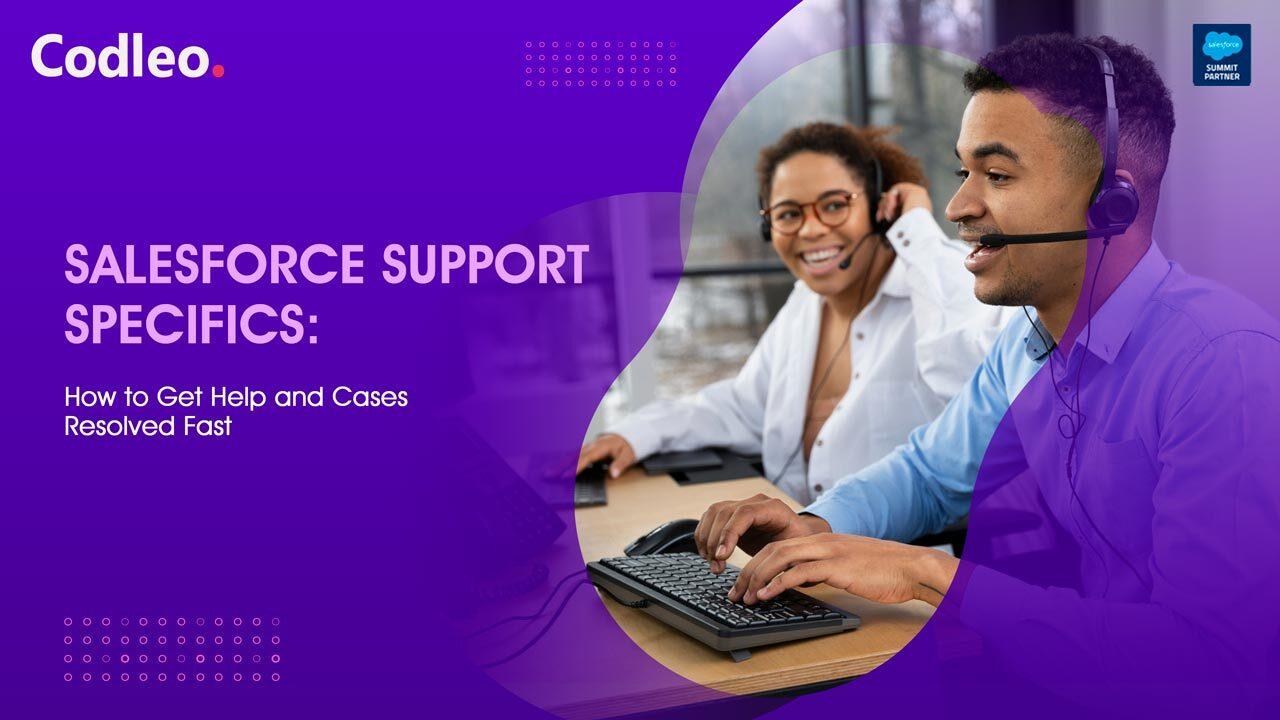
If you have a problem with your CRM system that affects your business, contact the Salesforce support team right away. Research from Khoros.com shows that 83% of customers are more loyal to brands that listen to and solve their complaints.
A Microsoft report, “Global Stats of Customer Service,” found that 58% of customers will stop doing business with a company after poor customer service.
Getting help from Salesforce support can be difficult, even for experienced users. That's why we researched the best ways to contact them quickly and how to get urgent assistance if they don’t respond.
You can easily contact Salesforce customer support for help. The best way to do this is through the Salesforce Help portal.
Before raising a support case, you must know how to access the Salesforce Support Portal. The Support Portal is the central hub for managing your support cases, accessing knowledge articles, and engaging with the Salesforce community.
To access the Support Portal, you will need a Salesforce account. If you don't have one, you can create a free Developer Edition account, which provides access to a sandbox environment for testing and development. Once you have your Salesforce account, follow these steps to access the Support Portal:
Go to the Salesforce website (www.salesforce.com) and click on the "Login" button at the top right corner of the page.
Enter your Salesforce username and password, then click "Login" to access your account.
Once logged in, navigate to the "Help & Training" section in the top-right corner of the page.
Select "Help & Training Home" from the drop-down menu to access the Salesforce Help & Training portal.
By following these steps, you can access the Salesforce Support Portal and begin your journey towards raising a support case.
Salesforce Help provides quick access to support, Premier features, and resources. Log in through Trailblazer.me to manage all your Salesforce organizations in one place. You can easily access Salesforce sites such as Trailblazer Community and Trailhead, view your organizations, and request assistance as needed.
Access to the Help portal depends on your license type. Users of services such as Social Studio or Pardot cannot access the Help portal using their service credentials.
Salesforce Help is a user-friendly self-service center where you can quickly find support without having to log a case. The homepage features four sections for easy access to key resources: Documentation, Trailblazer Community, Trailhead, and Events.
Salesforce provides help and troubleshooting materials, including guides, videos, and presentations, to support your goals.
The Trailblazer Community portal connects you with Salesforce experts, administrators, and other users. You can ask questions, share experiences, and suggest improvements.
On the online training hub, Trailhead, you can read articles, watch videos, and complete modules, quizzes, and challenges.
The Events section features a calendar of upcoming events, which you can sort by product, type, date range, and language. Select an event, register, and ask your questions directly to Salesforce experts.
Salesforce Help Portal Home Page
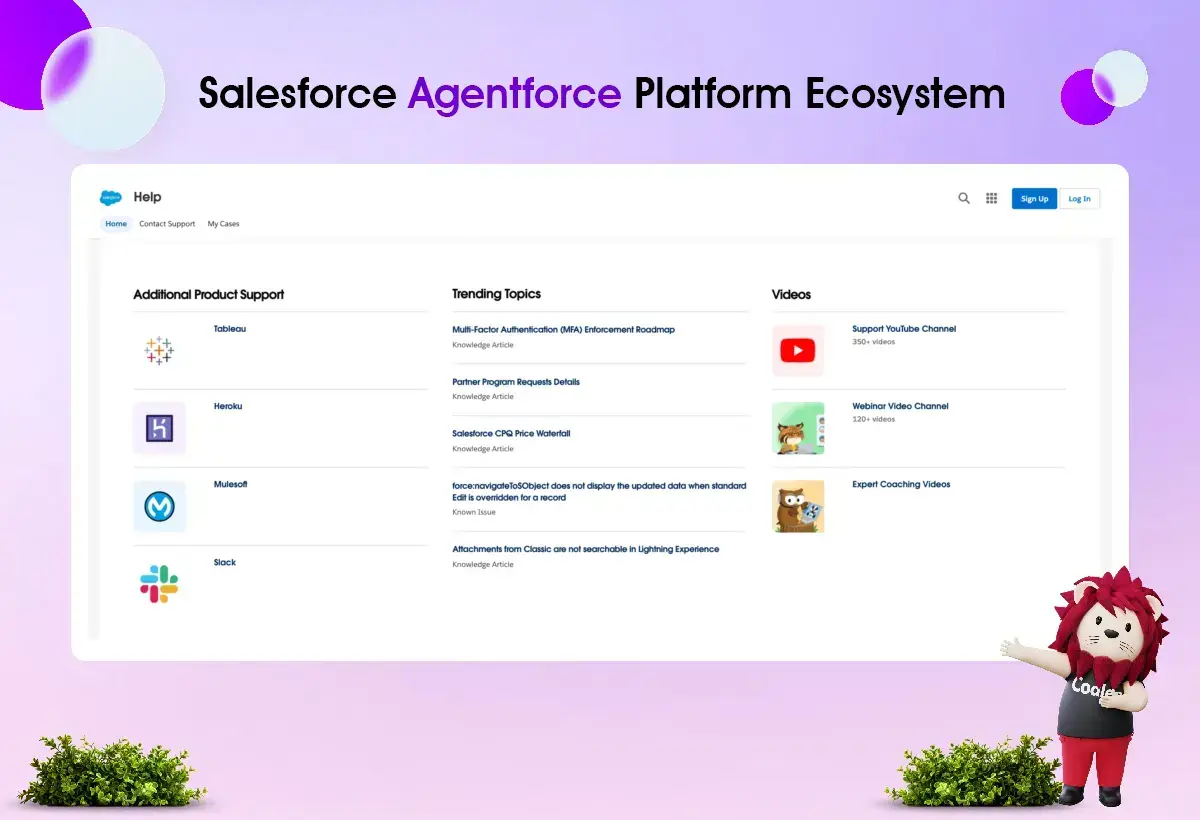
This guide navigates you from utilizing self-service resources to escalating to a high-severity support case. Besides that, the Salesforce Help home page has links to other sections:
Tableau support
Heroku support,
Mulesoft customer support,
Slack customer support.
On the Salesforce support desk, you can find helpful links, including:
Popular topics in the documentation
A YouTube Support Channel with tutorials and videos to improve your Salesforce usage and learn about new features
Webinar Video Channel: Join live workshops or access on-demand webinars for insights into Salesforce functionality.
Expert Coaching Videos: Access tutorials and guidance from Salesforce professionals.
If these resources do not resolve your issue and you have a Standard, Premier, or Signature account, you may log a Support Case. Follow these steps:
Log in to your Salesforce account and click the question mark “❓” in the upper right corner.
Click on “Get Support.”
Click “Contact Support.”
Click “Create a Case” on the “Create a Case” board. You will also see two other options: “Live Chat” and “Call Us.”
Choose either “Product” or “Technical Support” depending on your issue (if your problem is about contacts, invoicing, or payments, click “Log a Billing Case”).
Select the product you’re having issues with.
Choose the best topic. Your OrgID will be automatically filled in. If you can't find your OrgID or MID, there are links on the “Create a Case” page to help you find them. Ensure the support team can access your account for troubleshooting.
Enter a short subject for your case.
Fill in the description box with more details.
Select your time zone and check any boxes that describe how this issue affects your business. We’ll suggest a severity level, but you can change it if you prefer.
Attach any files or screenshots if you have them. You can attach up to 10 files, with each attachment limited to 4.2 MB.
You can add up to 20 people as Case Collaborators to keep them in the loop and help manage responses to email notifications regarding the case.
Click “Create a Case” to finish.
Level 1 – Critical: Key business operations have stopped without an effective workaround, creating a risk of financial loss.
Level 2 – Urgent: Key business operations are impacted, and no workaround is available.
Level 3 – High: Key operations are affected, but a workaround exists, or non-key operations are impacted without a workaround.
Level 4 – Medium (Non-key operations are affected with a workaround, OR no operations are affected)
After submitting your case, you can view details, add comments, and change the severity level if needed. Note that you can close cases created in the Help Portal, but you cannot delete them.
Salesforce provides phone support to Standard customers with critical issues (severity 1) and to Premier and Signature customers. In the US, Salesforce offers a dedicated support line for customers with hearing or speech impairments, called Salesforce Accessibility Support. These customers should contact the telecommunications relay service (TRS). To reach TRS anywhere in the United States, dial 711 or use the United States TRS directory to find the specific phone number for each state.
You can reach Accessibility Support at 1-866-284-6021 (toll-free, US only).
For Salesforce Premier Support (in English), call Monday to Friday from 8 AM to 8 PM EST.
For Salesforce Standard Support (in English), call Monday to Friday from 8 AM to 8 PM EST for Severity 1 issues.
You can contact Accessibility Support using the following phone number for help with Sales Cloud, Service Cloud, Marketing Cloud, Pardot, Salesforce CPQ, Salesforce Billing, B2B Commerce, and DMP.
Also, be ready to answer the following questions from the Salesforce support agent:
Your First and Last name
Your Email Address or Username
Your Account Name
Your Org ID
Your Phone Number
Your Salesforce Cloud or Product
The Case Number, if applicable
Additionally, Salesforce urges customers to confirm or update their phone numbers when they log in to Salesforce Help so the support team can locate their account information.
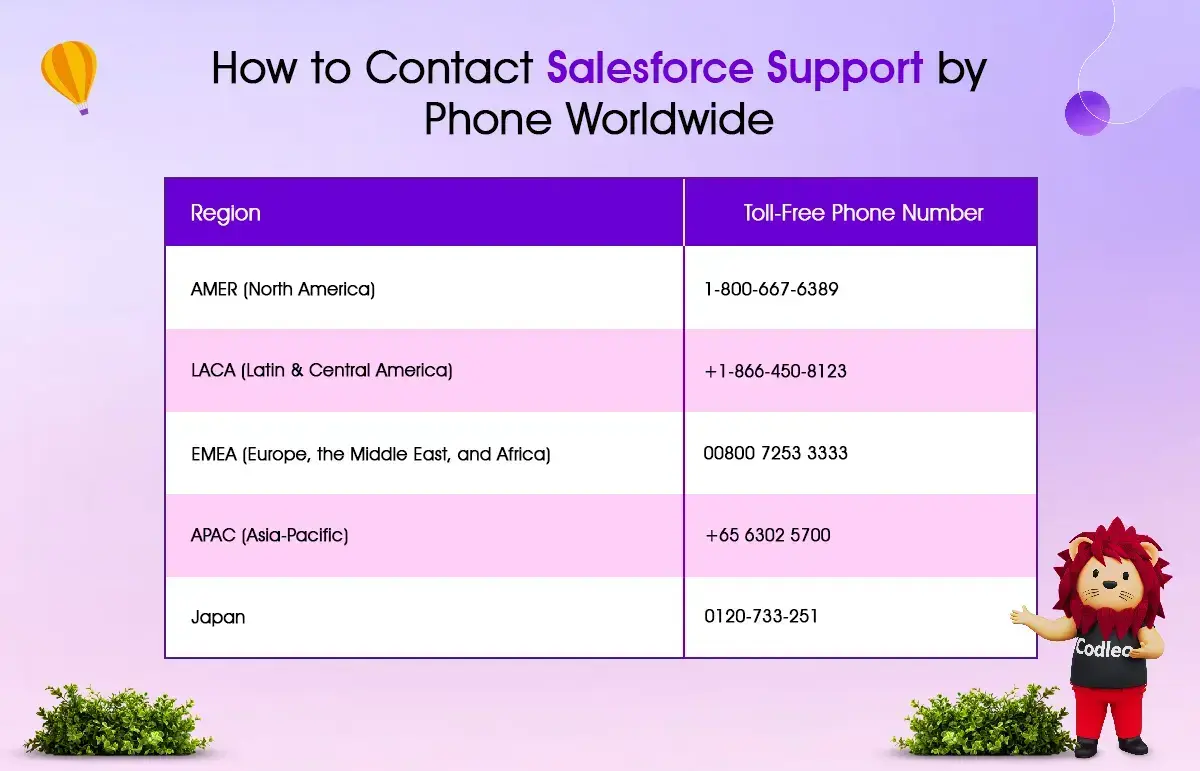
How to Call Salesforce Support by Region and Country: Salesforce Multi-language Support
English Support: 24/7
French Support (Canada): Monday to Friday, 3:00 AM – 11:30 AM EST
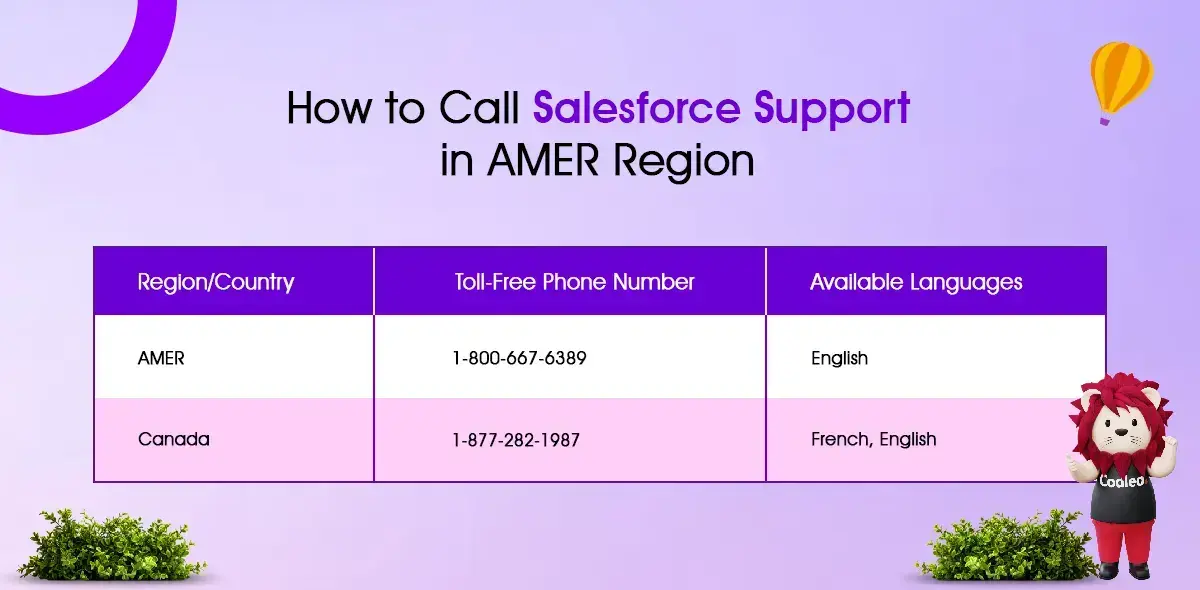
English Support: 24/7
Spanish and Portuguese Support: Monday to Friday, 8 AM – 8 PM EST
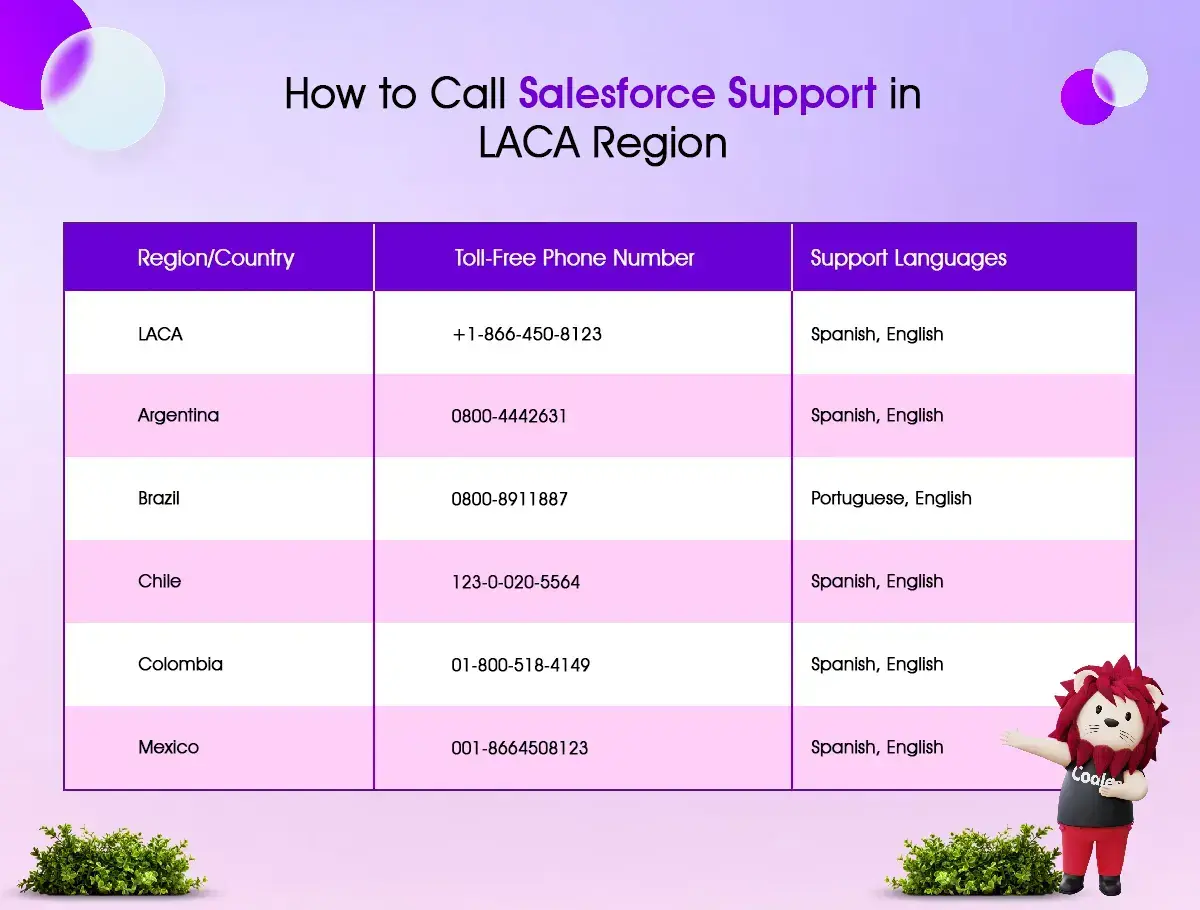
How to Call Salesforce Support in the LACA Region
Support Hours and Languages:
English Support: 24/7
French, German, Italian, Dutch, Spanish, and Portuguese Support: Monday to Friday, 8 AM – 4:30 PM GMT
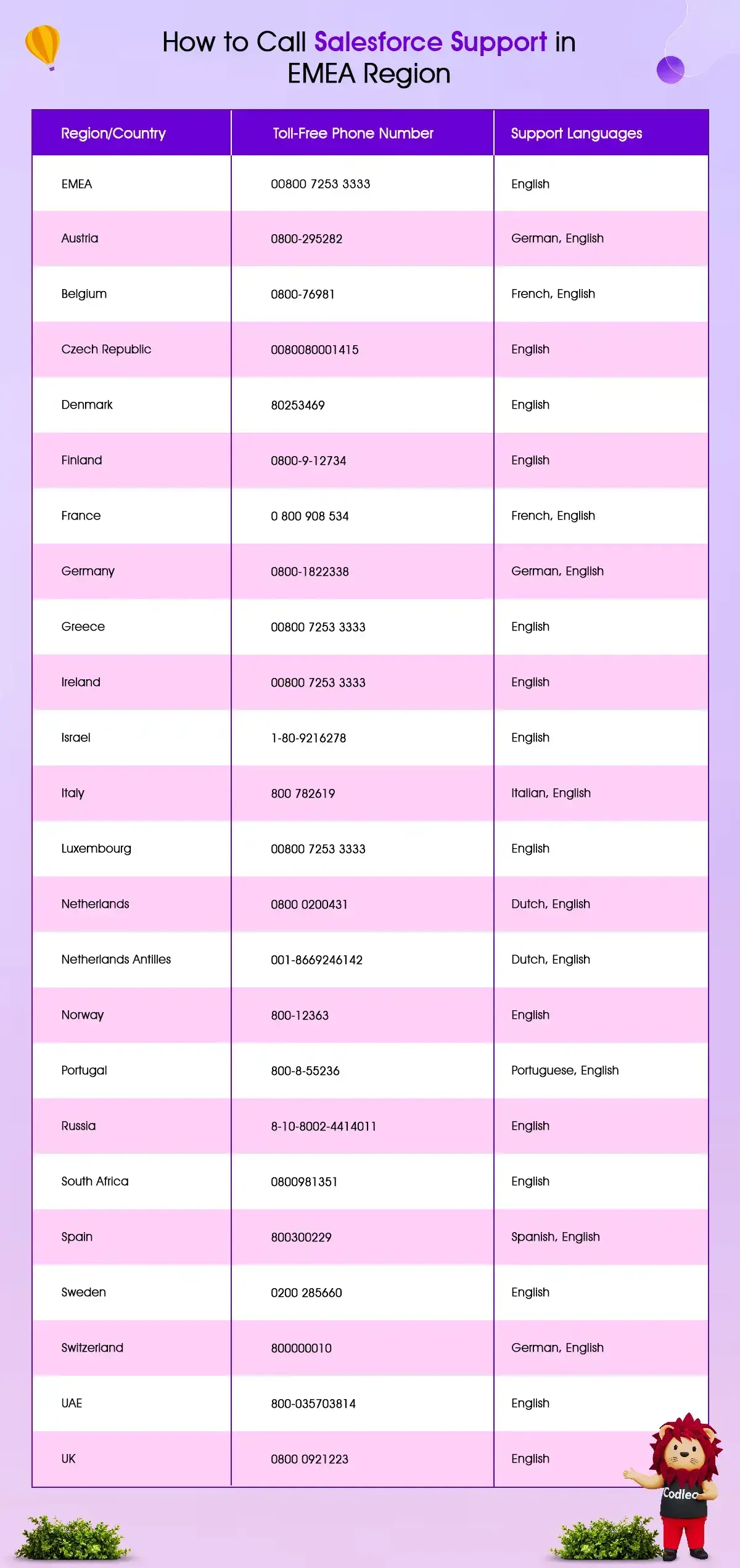
Support Hours and Languages:
English Support: 24/7
Mandarin and Korean Support: Monday to Friday, 10 AM – 7 PM AEST
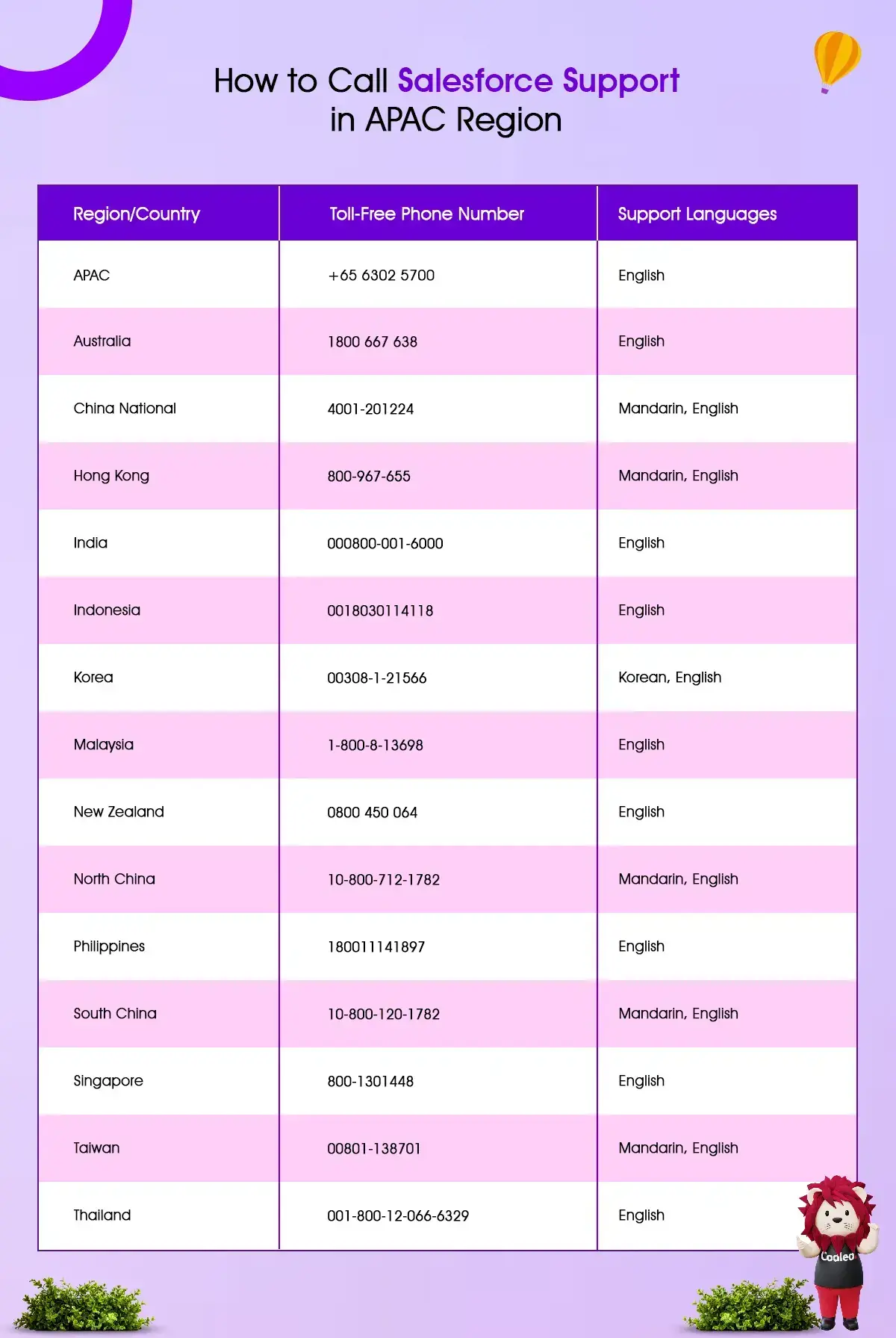
Please Note:
Japan Support is only available in Japanese. For English support, please call the APAC customer support number at +65 6302 5700.
To get Japanese Support, you need a Premier Passcode. Please have your passcode ready when you call Support.
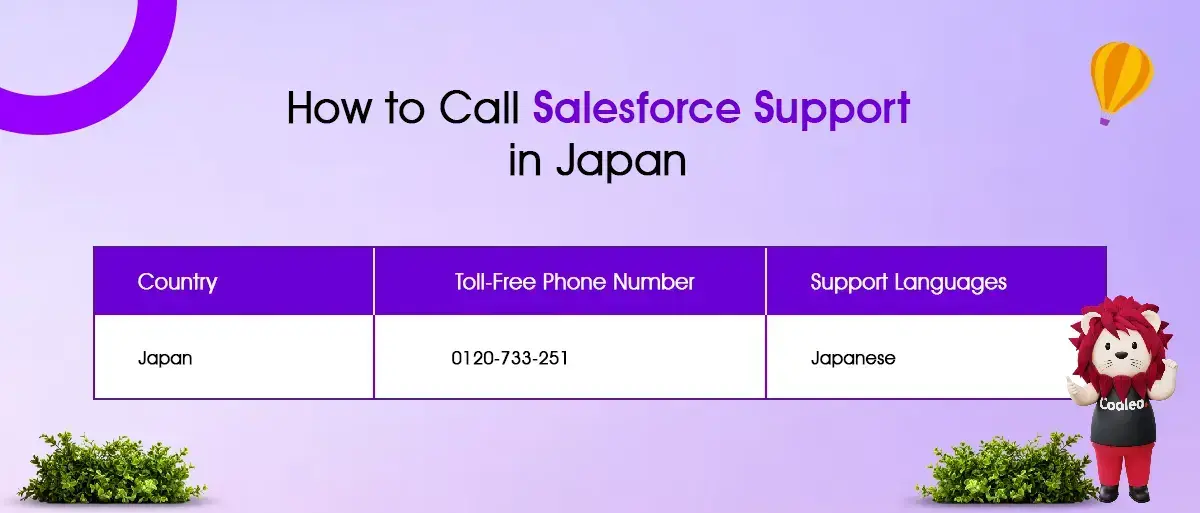
Service Cloud, Sales Cloud, Sales Analytics, and Service Analytics Support:
Premier Support: Available Monday to Friday, 9 AM – 6 PM JST. Emergency support is available 24/7.
Standard Support: Available Monday to Friday, 9 AM – 5 PM JST for Severity 1 issues.
Premier Support: Available Monday to Friday, 9 AM – 6 PM JST. Support for Severity 1 and Severity 2 issues is available 24/7.
Standard Support: Available Monday to Friday, 9 AM – 5 PM JST.
Premier Support: Available Monday to Friday, 9 AM – 6 PM JST. Emergency support is available 24/7.
Standard Support: Available Monday to Friday, 9 AM – 5 PM JST for Severity 1 issues.
Premier Support: Available Monday to Friday, 9 AM – 6 PM JST. Emergency support is available 24/7.
Standard Support: Available Monday to Friday, 9 AM – 5 PM JST for Severity 1 issues.
This support option is only for Premier and Signature customers with a Success Plan. To start a new chat session, follow these steps:
1. Log in to Salesforce Help.
2. Click on Contact Support.
3. Click on Live Chat.
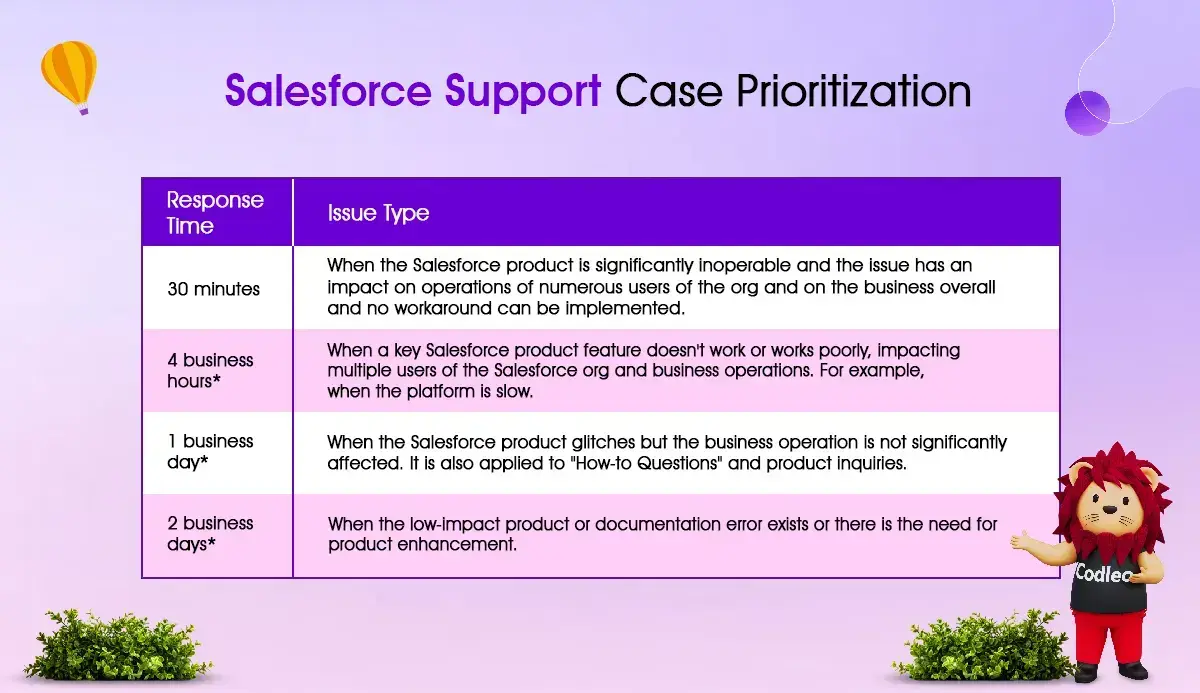
We prioritize tickets by issue severity. Our business hours are 8:30 am to 5:30 pm, Monday to Friday, excluding regional holidays.
You can get help for the following Tableau products:
Tableau Desktop
Tableau Prep Builder
Tableau Server
Tableau Online
Tableau Public
Tableau Mobile
Tableau Reader
Hyper API
In addition to submitting a support case, you can find help in other ways:
Browse the customer service FAQ, Knowledge Base, Tableau Server Upgrade Help Documentation, and Community Forum.
Reach out to Tableau support on Twitter @TableauSupport.
If you need help finding your site administrator, you can email Tableau customer service at customerservice@tableau.com.
Tableau also offers a Premium Support option.
The product you have a problem with and a description of the issue.
The impact and severity level of the problem.
Your contact information.
Your company name.
Your preferred language, support region, and time zone.
Heroku offers support for the main product areas:
General Platform Features,
Account Management,
Domains and Routing,
Billing and Payment,
Security,
Heroku Postgres,
Heroku Connect,
Heroku Redis,
Heroku Kafka,
CI & Pipelines & Review apps,
Platform Error Codes,
Command Line Tools.
If you need help, you can:
Look at the help documentation.
Search for questions on Stack Overflow.
Heroku offers two support plans: standard support, available 12 hours a day, and premium support, available 24 hours a day.
To submit a support case, log in to your Heroku account or email customer service at support@heroku.com using the email linked to your account.
You can also check the Heroku Status website for known issues.
You can ask for help with Mulesoft functionality via different portals:
General forum – Ask questions and share your knowledge with the community.
Training forum – You can discuss questions about training classes here.
Resources – A collection of technical documents, guides, and tutorials.
Discussion groups – You can share ideas and product news with your peers.
Community – Connect with other users at Meetups and meet Mulesoft Ambassadors.
Mulesoft Support – You can contact Support, log cases, and review your subscriptions here. To access your cases, downloads, and subscriptions, please log in with your Enterprise support account.
How Mulesoft handles customer support and its terms,
How the company gives feedback on support cases,
The support and troubleshooting tools available.
The Slack Help Center portal provides helpful articles on:
Getting started with Slack
Using Slack features
Adjusting your profile and preferences
Connecting and automating tools
Managing your Slack workspace
You can also find Slack tutorials there.
To contact Slack support, fill out the Contact Us form or sign in to your Slack account. If you decide to use the Contact Us form, you should:
Add an email address,
select a topic,
Describe the issue.
There is no phone number or live chat available on Slack Customer Support's website. You can email Slack Support at feedback@slack.com, which is listed on the AppExchange profile for the Salesforce for Slack app.
Great news! You've got access to the Salesforce Support Portal! Now, it's your chance to create a new support case. Please share the details of your issue or request; the more specific you are, the better our support team can assist you. We're here to help and look forward to resolving your concern together!
After you log in to the Salesforce Support Portal, go to the "Cases" tab or find the "Cases" section.
Find the "New Case" button or link, usually easy to spot on the page.
Click the "New Case" button to start creating your case.
Enter the required details, like the case subject, description, and your contact information.
Add any additional information or context that could help the Salesforce support team better understand your issue.
Check your case details to make sure everything is accurate and complete.
Click "Submit" or a similar button to send your support case to the Salesforce team. It is essential to note that different organizations may have specific guidelines or requirements for raising support cases. Familiarize yourself with internal processes and protocols to ensure a smooth case-creation experience.
When creating a support case, providing detailed and accurate information about the issue or request you are facing is crucial. The more information you can give upfront, the better equipped the Salesforce support team will be to help you effectively.
Here are some tips for providing detailed information in your support case:
Start by clearly explaining your problem or request. Provide a concise summary of the issue in the case subject and elaborate on the details in the description section.
Include any relevant error messages, error codes, or screenshots that can help the support team understand the issue more clearly.
Specify the steps you have taken to reproduce the problem or the specific functionality you seek assistance with.
If applicable, mention any recent changes or updates you have made to your Salesforce configuration that may be related to the issue.
Provide any supporting documentation, such as log files or data exports, that can aid in troubleshooting or resolving the case.
Be sure to include any specific requirements or constraints you may have, such as a desired resolution timeframe or any business impact the issue is causing.
By providing detailed information in your support case, the support team can better understand your situation, leading to faster, more accurate resolutions.
In some cases, attaching relevant files and documents to your support case can significantly enhance the support team's ability to assist you. Whether it's a log file, a screenshot, or a data export, these attachments can provide valuable context and help the support team identify the issue's root cause more effectively.
When creating or editing a support case, look for an option or button to attach files.
Click the "Attach File" button or link to initiate the file attachment process.
A file selection window will appear, allowing you to browse and select the file(s) you want to attach.
Choose the relevant file(s) from your computer or device, then click "Open" or a similar button to confirm the selection.
Wait for the file(s) to upload, then attach them to your support case. This process may take a few moments, depending on file size and internet connection speed.
Once the file(s) are attached, review your case details to ensure the attachments are visible and accessible to the support team.
It's important to note that there may be limitations on the file types and sizes that can be attached to a support case. Check the Salesforce documentation or consult your organization's administrator for specific guidelines or restrictions.
When raising a support case, it is essential to prioritize and categorize it appropriately. It helps the support team understand the urgency and nature of the case, enabling them to allocate resources and provide timely assistance.
To prioritize and categorize your support cases effectively, consider the following:
Prioritization: Determine the impact and urgency of the issue or request. Is it preventing critical business operations or causing significant disruptions? Assigning the appropriate priority level can help the support team understand the level of attention your case requires. Standard priority levels include "High," "Medium," and "Low."
Categorization: Identify the appropriate category or topic that best represents your case. It allows the support team to route your case to the most relevant experts who specialize in that area. Common categories include "Technical Support," "Salesforce Administration," or "Platform Development."
When creating a support case, you typically find fields or options to select the priority level and category. Assess the impact and nature of your case to ensure accurate prioritization and categorization.
Once your support case is created and submitted, you may need to communicate with Salesforce support representatives to provide additional information, clarify details, or discuss the progress of your case. Effective communication drives the resolution process forward and ensures a satisfactory outcome.
Here are some best practices for communicating with Salesforce support representatives:
Be responsive: When a support representative contacts you with questions or requests for more information, respond promptly. Timely communication helps keep the case moving forward and prevents unnecessary delays.
Provide clear and concise responses: When replying to support representatives, communicate clearly and concisely. Avoid unnecessary jargon or technical terms that may hinder understanding. If necessary, provide additional context or screenshots to clarify your point.
Ask for clarification if needed: If you receive a response or update from a support representative that you don't fully understand, don't hesitate to ask for clarification. It's better to seek clarification early on to avoid misunderstandings or misinterpretations.
Maintain a polite and professional tone: Remember that support representatives are there to assist you; therefore, it is essential to keep your communication polite and professional. Treat support representatives with respect and gratitude for their efforts in resolving your case.
Please keep track of communication: Maintaining a record of all communication related to your support case can be helpful. It can include emails, chat transcripts, or notes from phone conversations. Having a clear communication history record can aid in case management and prevent any miscommunication or confusion.
By following these communication best practices, you can establish a productive, collaborative relationship with Salesforce support representatives, resulting in a smoother resolution process.
It's natural to want to stay updated on the progress of your support case. By tracking progress, you can gain visibility into the actions taken, the case status, and any updates or resolutions provided by the support team.
To track the progress of your support case, follow these steps:
Return to the Salesforce Support Portal and navigate to the "Cases" section.
Locate your support case in the list of cases. You can search or filter instances by case number, subject, or status.
Click on your support case to view its details and current status.
Review the case details, including any updates or comments provided by the support team.
If you have any questions or concerns, use the communication channels provided by the Support Portal to contact the support team for clarification or additional information.
By regularly checking the progress of your support case, you can stay informed and ensure the support team is actively managing and addressing it.
The ultimate goal of raising a support case is to resolve your issue or request. Once the support team provides a solution, it is essential to review and validate the proposed resolution. If the solution meets your requirements and resolves the case satisfactorily, you can proceed to close the support case.
To resolve and close your support case, follow these steps:
When the support team provides a solution or resolution, carefully review the details to ensure they align with your expectations and requirements.
If you have any questions or concerns about the proposed resolution, contact the support team for clarification or further assistance.
If the solution meets your requirements and satisfactorily resolves the issue, communicate your acceptance and agreement to the support team.
Follow any additional instructions the support team provides to implement the solution or resolution, if necessary.
Once the solution is implemented and validated, inform the support team of the successful resolution and request that they close the support case.
Review the case closure confirmation provided by the support team to ensure all necessary details are documented.
By following these steps, you can effectively resolve and close your support case, marking the successful completion of the case resolution process.
Salesforce offers various ways to get support and solve problems, but many customers still feel frustrated. Customer service is a common topic on review sites and often appears on lists of Salesforce's strengths and weaknesses.
First, to access 24/7 support, you need to pay for it, as it's a premium feature. If you want your issue handled quickly, you need to purchase this option. However, even after paying, some Salesforce users report no guarantee that their issues will be resolved promptly.
It can be hard to reach a live Salesforce Customer Service team. Many reviews on different platforms mention difficulties contacting support agents.
Self-service portals provide limited support, and some questions may remain unanswered for extended periods. If you need quick support when it matters most, consider working with Salesforce consulting partners like Codleo.
We are CRM consultants with strong expertise in Salesforce. We can help you resolve your issue directly, without contacting Salesforce support. As your consulting partner, we ensure seamless platform maintenance and clear communication with our CRM support team.
You won’t have to navigate multi-step quizzes or complicated FAQs to get help.
We have made this process easier to help you get your business back on track during stressful times.
Our experts provide a wide range of Salesforce support and administration services, including:
24/7 system monitoring
System administration
Data administration
Salesforce health check
CRM concierge service
Salesforce development support and troubleshooting
AppExchange app development support.
We offer a variety of Salesforce products, including Sales Cloud, Service Cloud, Marketing Cloud, Pardot, Community Cloud, Financial Services Cloud, App Cloud, Health Cloud, and Einstein Analytics.
When you work with Codleo, you can choose how much control you want over your project. You can work with our Dallas team or outsource your project to our offices in Southern and Eastern Europe to reduce costs.
Publish date: 22nd April, 2025